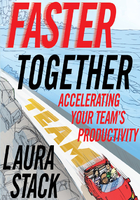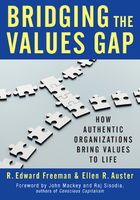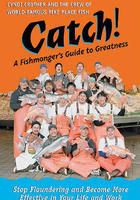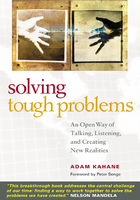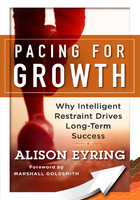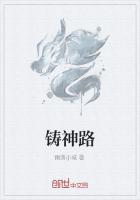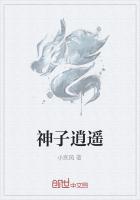THE FIVE-STEP PATHWAY TO MORAL DECISION MAKING
We found that every leader in our study, young or old, had undergone at least one intense, transformational experience.
Warren Bennis
In the middle of difficulty lies opportunity.
John Archibald Wheeler
Today a growing wealth of research supports the idea that leadership that is moral, other-centered, trustworthy, and compassionate empowers success. Social scientists such as Dacher Keltner, Martin Seligman, and Barbara Fredrickson have shown that the capacity for altruism is critical to good leadership. "Leaders, in every field," says business guru Warren Bennis, "are richly endowed with empathy." "The crucial decision," says distinguished Harvard business professor Joseph Badaracco, "is not whether we should rely on our ethical intuitions, but how to do so."
From Crisis to Calling holds these insights as truths essential to true leadership and, more importantly, critical to the business of living a good, fulfilling life, a life that affords a true sense of pride.
Some of our most prominent thinkers about leadership have reached similar conclusions about how character is formed. In searching out the essentials of how leaders are made, they have spent years observing and talking with famous and not so famous leaders about their lives. What have they found?
In his seminal book On Becoming a Leader, Warren Bennis wrote that leadership "always emerged after some rite of passage, often a stressful one." In a follow-up study, Geeks and Geezers, he elaborated: "We found that every leader in our study, young or old, had undergone at least one intense, transformational experience. That transformational experience was at the very heart of becoming a leader. The descriptive term we found ourselves using is crucible." Bill George wrote in his equally influential True North: Discover Your Authentic Leadership, "It is under pressure-when your success, your career, or your life hangs in the balance-that you must decide what your values are. When you are forced to make trade-offs between your values under difficult circumstances, you learn what is most important in your life and what you are prepared to sacrifice for."
Joseph Badaracco focused his discussion in Defining Moments more narrowly. The true test, he argues, comes when people must decide between two courses that may both be right. These "right-versus-right choices are best understood as defining moments…they reveal, they test, and they shape. In other words, a right-versus-right decision can reveal a manager's basic values…It shapes the character of the person and, in some cases, the organization."
Crucibles for Bennis. Defining moments for Badaracco. Finding your true north for George. Each of these writers looks at life and leadership from the standpoint of moral transformation and the discovery of an essential self-the fundamental values that define you as a person. Each in his own way makes the point that this essential self is essential also to the organizations the leader is part of. Leaders imbue their organizations and communities with values-that is, with the values they find within themselves. Authentic leaders are those for whom the values they live in their personal lives are the same as those they live in their professional lives.
Leadership writers, no matter how famous, tend to be known mainly within the business world, a vast yet limited sphere. But practitioners such as Bennis, Badaracco, and George-and perhaps Peter Drucker most of all-teach us universal lessons about human psychology, true for those of us in other fields of endeavor and true for those of us who live our lives in quieter, more inconspicuous ways. Business is, after all, a great moral theater, driven by the profit motive yet bound by commonly accepted ethical values. These values are often imposed by law, but they also invoke the better angels of our nature. Business is a stage where the desire to act for advantage often plays starkly against our more moral selves whose call we hear, if sometimes only faintly, amidst the competing noises of our lives.
Consequently, the "business" books leading thinkers write are often far more than business books. They suggest that business is a key to the human enterprise generally-the "business" of how we live our lives and how we should live our lives. True, then, for all of us.
It's one thing to say that character is formed, or discovered, in crucibles or defining moments. But ordinarily we do not look to get ourselves into situations like that. If anything, our default is to stay away from them, from the stress they bring, the failure they threaten, the difficult life changes they may portend. We are more motivated to stay in our safety zones, the places we feel comfortable. Others have expectations of us based on what we've done before and what they think we should be doing now. Those are forceful expectations. We know the behaviors that have worked for us in the past; we have little incentive and little desire to change those. We don't want to push the envelopes we've woven around ourselves. Whether they're constricting or spacious, we've woven them for a reason.
Yet none of us can avoid facing critical decisions. They come with the human territory. We may need to fire a subordinate or perhaps lay off an entire group. We need to choose between alternatives that may inflict pain on a friend or a family member. We face such decisions inevitably. When we do, we can choose to just forge ahead, turning a blind eye to the human side of what we think needs to be done. We can rationalize the necessity of our decision. We can compartmentalize-this is what I had to do, but it doesn't affect the person I really am. We can disregard the moral dimension of the decision, because that is easiest for us; it allows us to get on with our work and our lives.
But the truth is that such rationales-apparent necessity, the expectations of others, fear of failure-can never bring meaningful growth or change. Taking the easy or expected route may provide some transient gain, but far more often those kinds of responses leave us stranded in the same rut. As one business writer put it, "If you do the same as you've always done, you'll get the same as you've always gotten." Critical decisions carry with them the opportunity for transformation and creative growth, but only if we understand them that way. Only if we embrace them for their potential as turning points for ourselves and consequently for those whom we lead and whose lives we impact.
From Crisis to Calling reveals the opportunities present in the hardest decisions and explains how to take advantage of crises and make the unrecognized power of altruism work for you. It sets out the five principles inherent in confronting critical decisions:
1. Be prepared.
2. Open your eyes.
3. Confront yourself.
4. Know yourself.
5. Take courage.
Through moving stories of leaders from business, the military, humanitarian agencies, health care, and other fields, we will see these principles come alive in ways that illuminate and instruct. Readers will learn how others have built or changed their organizations and their own lives in response to the hardest challenges of their careers by opening themselves up to this five-step critical decision process. From Crisis to Calling shows how such challenges so often transform the nature of leadership and create different, more ethical, and more productive leadership practices.
From Crisis to Calling is in two parts. Part I is the story of Sasha and his colleague and the critical decision they faced. We tell the story in its entirety, then look at how it embodies the five-step critical decision process. Part II describes dramatic experiences in the lives of others that illuminate one or more of these steps.
Our goal is to engage leaders in business, nonprofit, and other fields, along with the general reading public, in this "hard decision" phenomenon. There is a transformative potential in choices where options are limited, painful, and full of the possibility of failure. Such choices may open an avenue to new, ethically centered thinking. We want readers to recognize, embrace, and act on their instinctive moral convictions, which these situations can reveal as perhaps nothing else can.
THE FIVE PRINCIPLES
1. Be Prepared.
Awareness is the first requirement. Situations arise that have a moral stake at their core. Be aware that these are decision points that can fundamentally affect the direction of your life and the life of your organization. Often we are closed to the possibilities inherent in such situations. We veer automatically toward the known, the conventional, the safe. We lean toward what others may expect of us and what we may expect of ourselves. We all too easily look the other way when a hard situation confronts us, particularly if opening our eyes might take us out of our comfort zone and down a risky path. Being prepared primes you to recognize these situations for the potential they afford.
2. Open Your Eyes.
Being prepared allows you to open your eyes to examine the decision confronting you with candor. You have given yourself permission to leave your cubicle and accept the possibility that the expected path, the conventional path, is not the only path, and, in fact, may well be the wrong path. Now at least you can see the issue clearly, in particular the moral options facing you.
3. Confront Yourself.
Once you have opened your eyes to the challenge in front of you, you need to explore what to do. Often these decisions are not clear-cut. It's easy to understand a decision when we are presented with a clear right and a clear wrong. It's harder to uncover the proper course forward when any action can bring about good as well as bad consequences-which is often the case in complex organizational decisions. It's important, then, to explore and discuss, to have someone who can challenge your beliefs and values. Great literature is full of iconic helmsmen who are able to lead the hero through the labyrinths of doubt. You may have some wise counselor or partner of this kind; if not, you will need to be your own helmsman. Either way, be aware that you need the argument, you need to undergo the hard test. Otherwise, opening your eyes may not be enough.
4. Know Yourself.
The process of confrontation and discussion will clarify the decision you have to make, but it will likely have more profound consequences as well. The values you have brought with you to this crucial decision may have served you decently to this point in your career. But facing a moral crux-accepting it, opening your eyes to it, confronting yourself over it-can reveal the underpinnings of your own moral life that may have been opaque to you or perhaps relegated to the sidelines or suppressed in the course of building your career. Moral crucibles have great power to create change. They can put you in touch with your inner self and connect you with your past experiences and even your family history in a way ordinary life does not. They can highlight for you the gap between who you are and who you would like to be. They can give you the wherewithal to tap into the underlying empathy, compassion, and feeling for others so significant in living a fulfilling life and creating an organizational culture that embodies its leader's principal values.
5. Take Courage.
Once you have tapped into your own set of primary values, you will likely understand what the right course of action is for you. That course of action may be the more difficult one. It may bring with it the risk of failure and many negative consequences. How do you make the right decision in the face of fear and potential obstacles? Courage is the crucial quality here, which is always magnified by the force of moral conviction.
Sasha's story takes place in the humanitarian sphere, but the Congo rescue mission story is a paradigm for decision making in many fields. Business leaders frequently confront situations that call for difficult moral judgments, pitting financial pressures against moral considerations. We see their failures regularly, from Enron, WorldCom, and Volkswagen to others that make the news from week to week. Even in the normal course of business life, when businesses are operating within the expected norms, the conventional response to such moral decision points is to make the apparently more profitable choice.
For managers-especially in business but in other fields as well-the concept of moral leadership may feel idealistic, abstract, something we'd like to practice but that seems distant from the real world of efficiencies, productivity, and the bottom line. Leadership often assumes the ability to make tough-minded decisions that subordinate feelings of altruism, sympathy, and compassion to the need for results. By this criterion, leaders need to be hard-nosed realists, maybe not impervious to human feeling, but able to rise above it in order to achieve success for themselves in their careers and success for their organizations in their businesses.
That commonplace wisdom-the leader as a realist able and willing to apply cool, impersonal reasoning to what are often messy and painful human problems-seems natural, an inbuilt requirement for successful managers. "The boss is a bastard" is a cliché. The boss may or may not be a bastard, but he or she must have a well-developed impersonal and hard-edged approach to making decisions.
A look below the surface reveals another side of leadership.
The Fortune 100 Best Companies to Work For operate on a variety of business models. They provide different pay levels and perks for their employees, but their cultures are universally built on trust, fairness, equitability, and ethical leadership. They are typically philanthropic; they give back to their communities. They incorporate a core set of values that are often at odds with conventional bottom-line thinking. They endow their employees with a sense of dignity, potential, and self-worth. They do this, as Warren Bennis and others argue, first and foremost because their leaders embody empathic, humane values that flow down like water to those around them. Such individuals are, in Daniel Goleman's phrase, "primal leaders." They "resonate." Bill George calls them "authentic leaders," true to themselves.
Many of these leaders have eye-opening defining moments when convention and commonplace wisdom seem to dictate a course of action, but a challenging dilemma reveals a different path, marked by empathy and compassion.
This "hard decision" experience is rarely explored, yet it is a widespread phenomenon in moral development that has great relevance for understanding leadership and institutions. It illuminates the path leaders should be explicitly aware of-that these kinds of decisions can and do serve as guides through the intersection of personal values and institutional or organizational leadership.
This is the subject From Crisis to Calling will take up. We will be looking at individuals whose experiences illustrate the different dimensions of our paradigm. We will look at the situations that motivated them and at the consequences for their lives and the lives of their organizations. The ultimate message is about how challenging situations can reveal deep personal values and about the power and fulfillment that come from investing your work with compassion, empathy, and the awareness of others.

